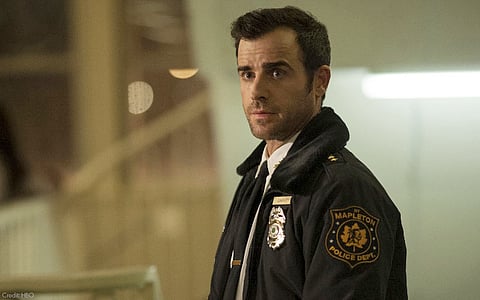
- In-Depth Stories
- Web Stories
- Reviews
- News
- FC Lists
- Interviews
- Features
- FC SpecialsFC Specials

At a crucial point in Shakespeare's Macbeth, Malcolm exclaims, "the grief that does not speak, whispers the o'er fraught heart and bids it break." This is quite the metaphorical summary of this groundbreaking series premiered in 2014 by Lost creator Damon Lindelof. Skillfully adapted from the novel of the same name by Tom Perotta, the show did not fall for the lure of commercial trappings and stayed true to its initial goal of three brief seasons.
What happens when two percent of the global population suddenly disappears? No context is provided, no reason is given. There are no patterns to the disappearances. In some cases whole families disappear, leaving only the mother. Newborn babies, babies from the womb, older people, teenagers–no one is spared. But are they the real victims? Clearly, the victims are now the people who were spared, so to speak, the 'Leftovers.'
How do we process the loss of our loved ones when they disappear right in front of us? Cults are formed, relationships are frayed, validity of basic truths is questioned. One such cult features prominently– 'The Guilty Remnants,' presided over by Ann Dowd of Aunt Lydia fame. They stalk people, reminding those who desperately want to forget and move on because the ambiguity of their loss is simply too unbearable to process.
With a searing piano score by Max Richter, The Leftovers provides no easy answers, or rather no answers at all. It is not a suspense thriller with the ghost of Dan Brown pacing across its canvas. It does not do this to come across as pretentious, or to conceal crucial plot points in hollow metaphors. It simply presents a host of characters who will surprise even themselves when they will find frightening ways to compensate for their loss and process trauma. Some will fall for these cults, some will punish their bodies by wearing bulletproof vests and paying hookers to shoot them just to feel some pain, some will give free hugs while others will hunt stray deers in the dark of the night with a disturbingly calm composure.
Not quite surprisingly, there is religion too. A priest whose wife has stopped speaking since the 'departure' took place. When every single foundation on which faith premises itself is shaken to the core, how then does it provide a panacea for those banking on it for answers?
If you are worried whether basic exposition has been sacrificed, it hasn't. After a few episodes you realize that simply was never the point of the show. It does not employ shallow cinematic ploys to appeal to the lowest common denominator. You could reasonably argue that the show is, in many ways, a more persuasive and accessible take on the David Lynch school of storytelling.
The Leftovers has an interrogative take on nihilism and other -isms we so deeply believe are capable of explaining away the heavily nuanced life unfolding before us. And in that sense, it manages to do what only few shows on mainstream TV can risk doing–getting intensely personal, holding nothing back, and calling us out for the fragile species that we are, calling us out for how comically we cling to perfections and clear answers and happy dreams. With a mirror-like narrative precision, it projects on the screen our vulnerabilities and their intersections with others, which we've known all along but were too afraid to acknowledge.